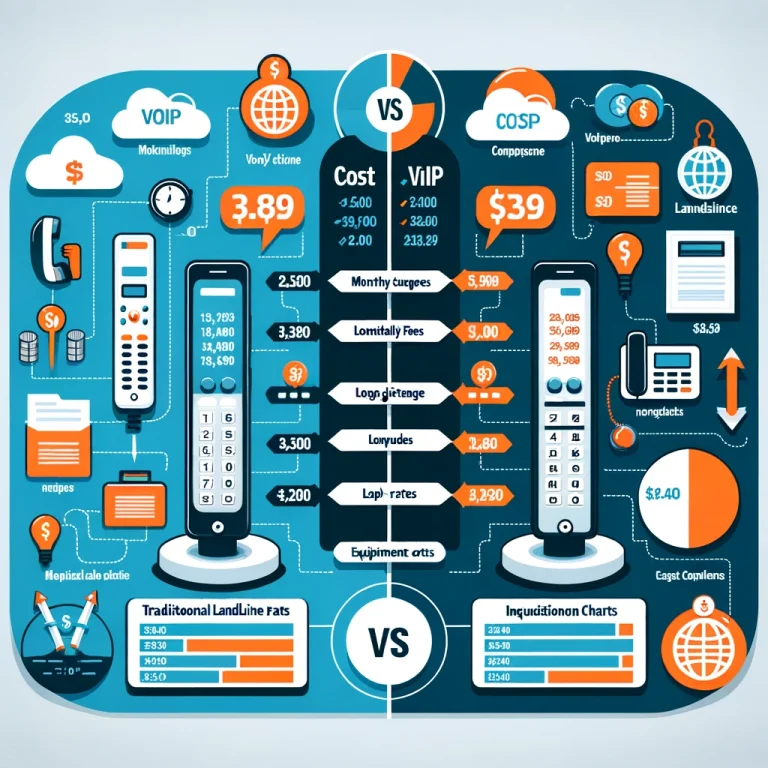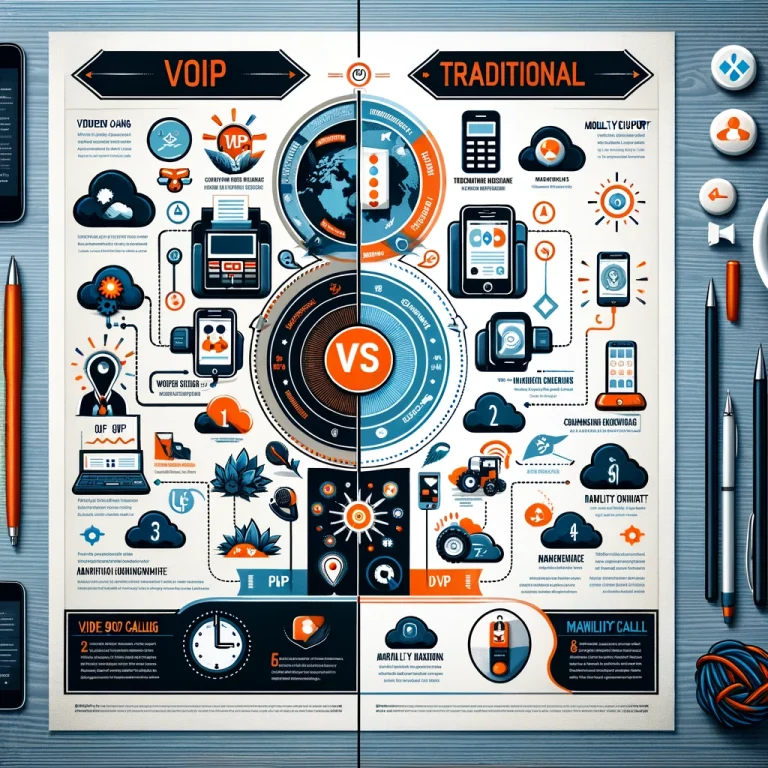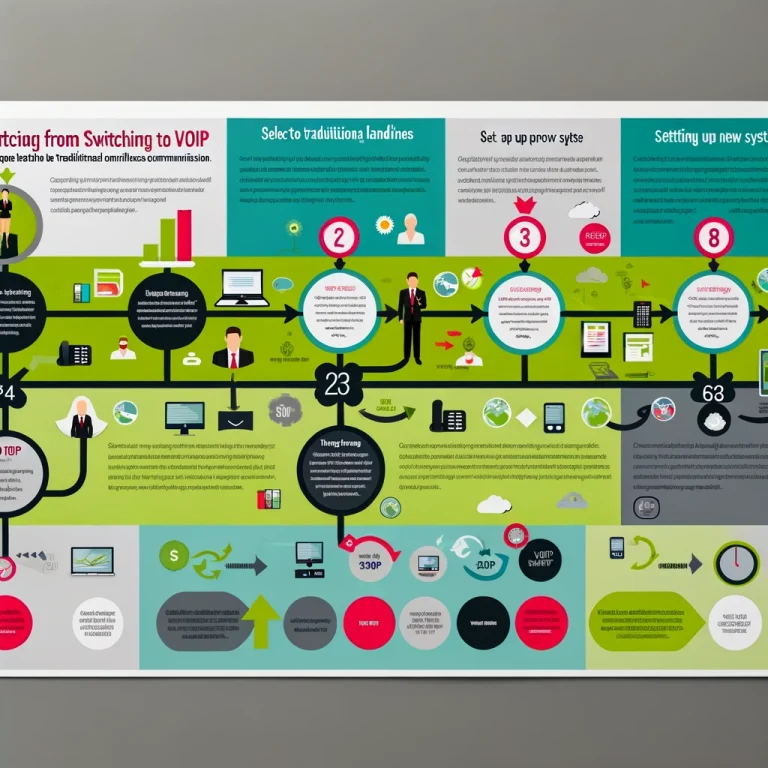Key take-aways for VoIP vs. Traditional Landlines
1. Cost Savings: VoIP vs. Traditional Landlines is recognized for its ability to significantly reduce communication costs, especially concerning monthly fees, long-distance, and international calls. For those interested, further details are provided in our cost comparison guide
2. Feature Availability: With VoIP, users gain access to an extensive array of features, such as video calling, mobility support, and advanced call management, which traditional landlines simply cannot match. Discover the full range of features at VoIP features comparison.
3. Flexibility for Businesses and Individuals: The internet-based nature of VoIP allows for unmatched flexibility and scalability, making it an ideal choice for growing businesses and remote work environments. Insights into VoIP’s adaptability can be found on our scalabilty.
4. Reliability Concerns Addressed: While traditional landlines are known for their reliability without internet dependency, VoIP services have made significant strides in reliability, offering solutions for continuous communication even during internet outages.
5. Security Considerations: Security is paramount with VoIP services, but with the right precautions and advanced encryption technologies, these concerns are effectively mitigated. For tips on securing VoIP services, visit our security best practices.
6. Ease of Installation: Compared to traditional landlines, VoIP systems are easier and more cost-effective to install and maintain, offering a quick setup process. For guidance, check out our ultimate guide to setting up DID.
In the evolving landscape of communication, the debate between VoIP and traditional landlines remains pivotal. Progressive Telecom LLC, a leader in VoIP and SMS wholesale since 2010, sheds light on this comparison. Focused on serving a diverse clientele, including SMS and VoIP administrators, engineers, sales representatives, consultants, start-ups, enthusiasts, and wholesale carriers, our analysis aims to guide those interested in VoIP and SMS wholesale towards informed decisions.
Cost Comparison for VoIP vs. Traditional Landlines
Remarkably, VoIP emerges as the cost-effective alternative. Monthly fees, long-distance charges, and international call costs are significantly lower with VoIP. Conversely, traditional landlines entail higher monthly fees and substantial charges for long-distance and international calls. Equipment and installation fees also lean in favor of VoIP, offering minimal initial investment compared to the often pricey setup of landlines.
Monthly Fees: VoIP services typically offer lower monthly rates compared to traditional landlines.
International Calls: VoIP users enjoy drastically reduced rates for international communications.
Equipment Costs: Initial setup for VoIP is generally more affordable, with many services requiring only a reliable internet connection.

Feature Comparison
VoIP technology outshines traditional landlines with its plethora of features, including video calling, mobility, and advanced call management options. These features support remote work and ensure seamless communication, pivotal for modern businesses. Landlines, while reliable and independent of internet connectivity, fall short in offering such flexibility.
Remote Work Compatibility: VoIP’s flexibility and feature set support remote and hybrid work environments.
Video Calling and Conferencing: A standard with VoIP services, enhancing collaboration.

Reliability and Quality for VoIP vs. Traditional Landlines
Traditional landlines are known for their unmatched reliability, operating without needing an internet connection. These systems work even during power outages, keeping emergency services within reach.
On the other hand, VoIP’s reliability largely hinges on internet quality, impacting call clarity. Nonetheless, recent technological improvements have greatly reduced such concerns. For tips on enhancing VoIP call quality, check out our guide here

Security and Disaster Preparedness
Security issues, particularly cyber attacks targeting VoIP, are effectively managed with stringent encryption and robust safety protocols.
Meanwhile, traditional landlines, though less prone to these cyber risks, lag behind in disaster readiness. Interestingly, cloud-based VoIP technologies stand out for their agility in crises, capable of swiftly rerouting calls to unaffected regions.
This feature ensures that, even in the face of unforeseen events, communication remains uninterrupted. Consequently, while both systems have their unique strengths, VoIP’s advanced disaster preparedness provides an additional layer of reliability not found in traditional landline setups.

Making the Switch
For businesses mulling over the switch from traditional landlines to VoIP, the transition holds the promise of significant cost reductions, access to superior features, and enhanced scalability.
Our ultimate guide to setting up DID is packed with crucial advice to ensure a smooth transition. By making this move, companies can expect not just to lower their expenses but also to benefit from more sophisticated communication capabilities.
Additionally, VoIP systems offer the flexibility to scale up or down with ease, catering to the dynamic needs of growing businesses. This adaptability, combined with cost efficiency and a richer set of features, makes the shift to VoIP an attractive proposition for forward-thinking companies.

Table: VoIP vs. Traditional Landlines at a Glance
Aspect | VoIP | Traditional Landline |
Monthly Fees | Lower | Higher |
Features | Extensive (video calls, mobility) | Limited |
Call Quality | Dependent on internet | Consistent |
Reliability | High with stable internet | Very High |
Installation Cost | Lower | Higher |
In conclusion, the choice between VoIP and traditional landlines depends on specific needs, with VoIP offering compelling advantages for modern, internet-connected businesses and individuals seeking cost-effective, feature-rich communication solutions. Progressive Telecom LLC remains committed to providing expert, authoritative, and trustworthy services in the VoIP and SMS wholesale market.
Conclusion VoIP vs. Traditional Landlines
1. Cost Efficiency: VoIP services are typically more cost-effective, offering lower monthly fees and significantly reduced rates for long-distance and international calls. An in-depth comparison can be found on our cost comparison guide.
2. Feature Richness: Unlike traditional landlines, VoIP comes loaded with advanced features like video calling, mobility, and extensive call management options. These features greatly enhance remote work capabilities. Explore more about these features at VoIP features comparison.
3. Flexibility and Scalability: VoIP’s internet-based nature allows for unparalleled flexibility and scalability, adapting easily to the growing needs of businesses. For insights into how VoIP supports business growth, visit our page.
In conclusion, the choice between VoIP and traditional landlines depends on specific needs, with VoIP offering compelling advantages for modern, internet-connected businesses and individuals seeking cost-effective, feature-rich communication solutions. Progressive Telecom LLC remains committed to providing expert, authoritative, and trustworthy services in the VoIP and SMS wholesale market
FAQs
Q: What are the primary cost differences between VoIP and traditional landlines?
A: Generally, VoIP is found to be more cost-effective. With VoIP, lower monthly fees, reduced charges for long-distance and international calls are observed. In contrast, traditional landlines often come with higher monthly fees and significant charges for longer distance communications. For more details on cost savings with VoIP, visit our cost comparison guide.
Q: How do the features of VoIP compare to those of traditional landlines?
A: VoIP provides a broader range of features, including video calls, mobility, and advanced call management options, enhancing support for remote work. Traditional landlines, while reliable, offer limited features focusing primarily on voice communication. For a comprehensive list of VoIP features, explore our feature comparison page
Q: Can VoIP services be used during internet outages?
A: Since VoIP relies on internet connectivity, services may be impacted during outages. However, many VoIP providers offer mobile app solutions that can use cellular data, providing an alternative. Conversely, traditional landlines do not depend on the internet, remaining operational during power or internet outages. Insights on ensuring continuous communication can be found in our guide.
Q: Are there security concerns with using VoIP?
A: VoIP, like any internet-based service, faces potential security risks. Nevertheless, with the adoption of advanced encryption and security measures, these concerns are significantly mitigated. Traditional landlines are less susceptible to cyber threats but lack the advanced security features of VoIP. Our security best practices offer guidance on securing VoIP services.